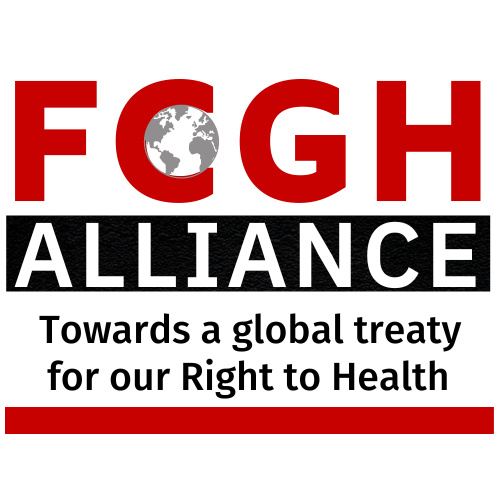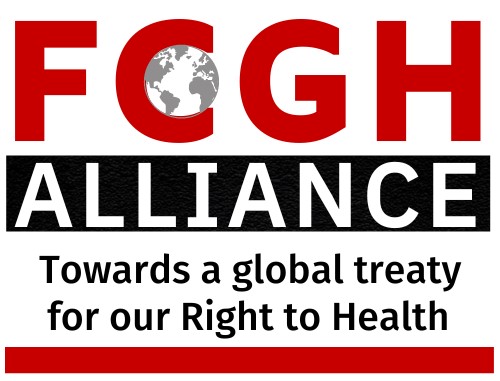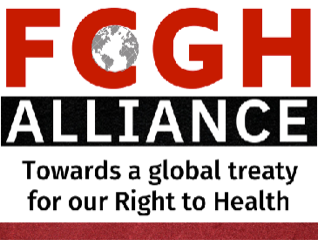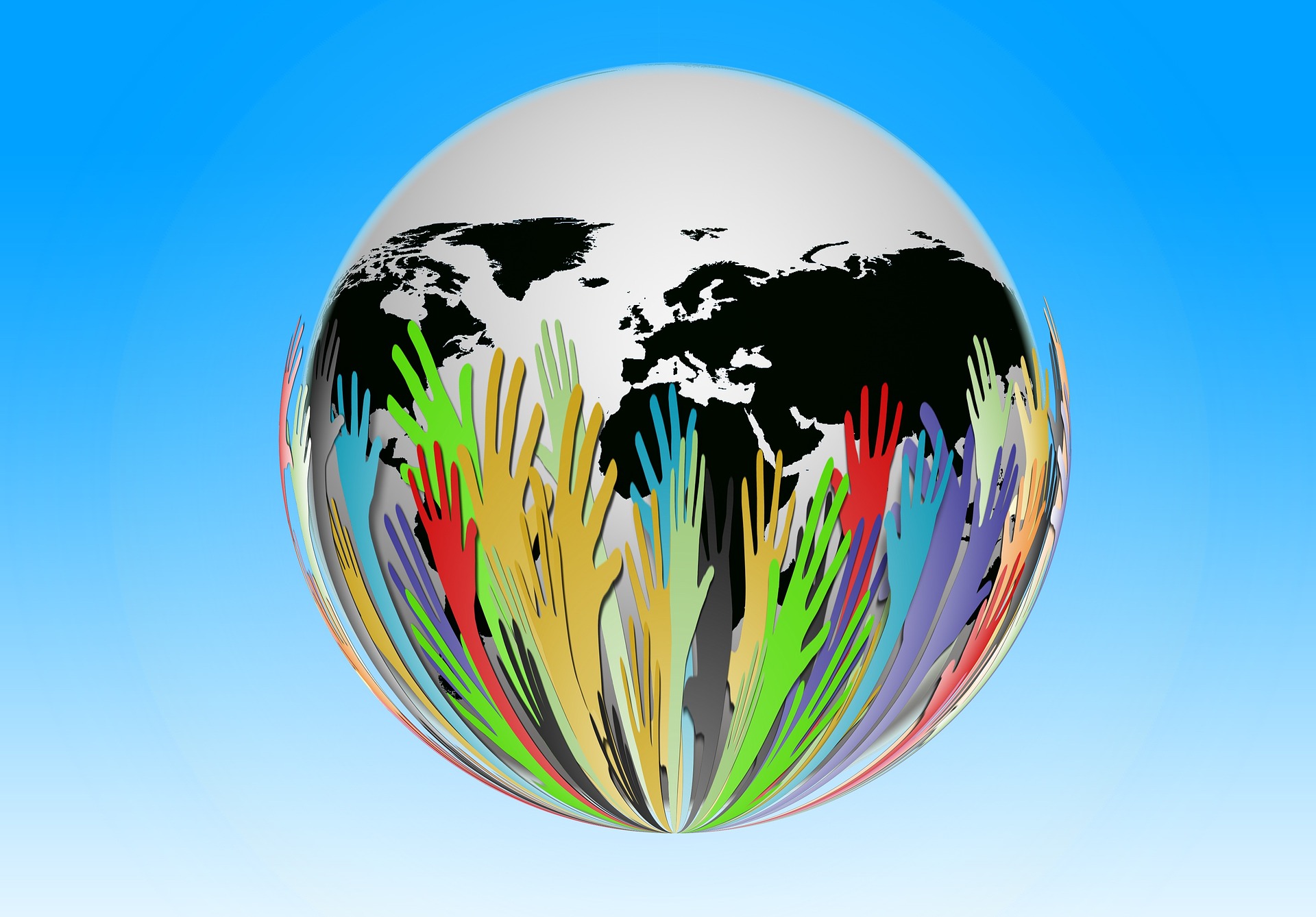Submitted by Adam Bertscher, Leigh Haynes, Eric Friedman, Martín Hevia
‘The world is only as strong as our weakest health system’
United Nations Secretary General António Guterres at the launch of the Global Humanitarian Response Plan for COVID-19 (25 March 2020)
The Framework Convention on Global Health (FCGH) Alliance extends our condolences to all the families of the victims of the COVID-19 pandemic. Our thoughts are also with the courageous frontline workers around the world who are risking their lives and the lives of their families to fight this pandemic and provide essential services to the public.
At the time of writing nearly 3 billion people around the world are in lockdown due to COVID-19, adhering to varying degrees of government advice and orders to stay at home. As we do what we must to prevent the spread of the virus now, what can we do to avoid this needless loss of life, suffering and global economic turmoil in a future health crisis?
The need for a Framework Convention on Global Health
We ask you to join the FCGH Alliance in calling for an effective and practical solution to prevent and mitigate public health threats, such as the COVID-19 pandemic. We call for the development and adoption of a legally binding global health treaty, a Framework Convention on Global Health (FCGH), based on the right to health, a fundamental human right.
The adoption of a global health treaty, which the FCGH Alliance has been advocating for, would include an internationally agreed set of principles, standards and mechanisms allowing governments to act faster to contain pandemics. This would be operationalised by supporting each other through international cooperation, investment in resources for health, and sharing resources, knowledge and effective control strategies. With such global support, countries would be better prepared for and more effectively respond to public health emergencies, enabling them to contain epidemics. An outline of the proposed treaty can be found here.
An FCGH would improve compliance with the right to health in all countries that join this agreement, and in countries that it might influence. And during times of global crisis, such as the current COVID-19 pandemic, such a global health treaty may ensure that countries incorporate into their responses accountability and participation mechanisms that pay special attention to, and engage, marginalized and vulnerable members of society. Governance mechanisms could be put in place to help ensure that the needed expertise and medical supplies are produced quickly and distributed equitably, going to those regions and communities that are the hardest hit.
An FCGH could also improve technical responses, with the aid of organisations that have technical knowledge and skills to manage health systems and pandemics in a way that does not overlook marginalized and vulnerable people. Such mechanisms would be especially important for ensuring the participation of civil society and legal experts so that any public health measure taken, especially to prevent or contain the spread of an infectious disease, respects human rights and democratic freedoms.
Harnessing the power of international law and the right to health, an FCGH could even help prevent outbreaks from occurring in the first place. For example, right to health assessments might block projects that contribute to environmental degradation and the human-animal interchange that leads to outbreaks. This may spur countries to enact stricter regulation and controls of animal markets, where people might contract deadly pathogens. Enhanced opportunities to participate, or even fund right to health advocacy that the FCGH could catalyse, could also contribute to such measures.
The world must invest in health today
Current investment in health and the available global governance tools and frameworks are not enough. Even if the wealthiest nations on the planet were to do their best to invest in their health systems – achieving universal health coverage and being as prepared as possible for the next pandemic – it would still in inadequate. Provisions of the International Health Regulations that aim to reduce the spread of infectious diseases through controlling international trade and travel are also not sufficient. This is because, to echo United Nations’ Secretary-General António Guterres, when launching Global Humanitarian Response Plan for COVID-19: “The world is only as strong as our weakest health system”.
Infectious diseases do not respect borders. In our globalised world, if an infectious disease arises in one country, it is not long before a highly infectious pathogen will spread all over the world. An FCGH would foster international cooperation and provide pathways for coordinated decision making between countries to tackle these kinds of challenges now and in the future.
From financing frameworks and target-setting to accountability mechanisms and participatory policymaking, an FCGH would help guarantee that governments are doing their utmost to invest all necessary resources in their health systems so that they are resilient enough to withstand public health threats and even pandemics. And investments in health systems will enable health workers to be appropriately prepared, trained and have the necessary protocols in place.
The relationship between unhealthy commodities and pandemic preparedness
One of the best ways to be prepared for pandemics is for populations to be as healthy as possible so that an individual’s own immune systems can most effectively fight infections. Healthy populations are all the more important for new and emerging diseases when medical treatment might not be immediately available. As we have seen with COVID-19, people with a variety of chronic health conditions may be more vulnerable. Indeed, 71% of global deaths (40.5 million) are due to noncommunicable diseases (such as diabetes, cancers, respiratory diseases and cardiovascular diseases). Countries whose populations have high proportions of immunocompromised individuals or individuals with preexisting health conditions could be at greater risk from infectious diseases, including ones most likely to lead to epidemics and pandemics.
To achieve pandemic preparedness in earnest, we need to ensure certain industries are appropriately regulated. An FCGH with a mandate that incorporates enforcing the right to health across all actors, including private industry, would provide a strong basis to effectively control industries that produce, sell and encourage the consumption of unhealthy commodities (such as tobacco, alcohol, ultra-processed foods and sugary beverages) that contribute to high burdens of noncommunicable diseases. For the right to health is the right to the highest attainable standard of health, requiring robust regulation.
A global health treaty would protect the global economy
A global health treaty based on the right to health would not only save lives but would also protect local and global economies and people’s livelihoods. We are witnessing the economic havoc brought about by the COVID-19 pandemic. An FCGH that catalyses investment in health systems and pandemic preparedness around the world would help protect the global economy by likelihood of – and health risks from – disease outbreaks, thus mitigating the loss of income for millions of people. A global health treaty that protects and promotes the right to health is therefore an economic imperative.
Call to action
With the unprecedented emergence of the COVID-19 pandemic, the FCGH Alliance issues this call to action and asks for your support. We ask you to join us in calling for your national governments and world leaders to begin to develop a global health treaty based on the right to health.
The FCGH Alliance and its Executive Committee will be continuing to work hard on its advocacy efforts so that we can avoid this entirely preventable loss of life, livelihoods and suffering and disruption from happening in the future.
To support our efforts and become member of the FCGH Alliance please email us or submit an application to become a member.





